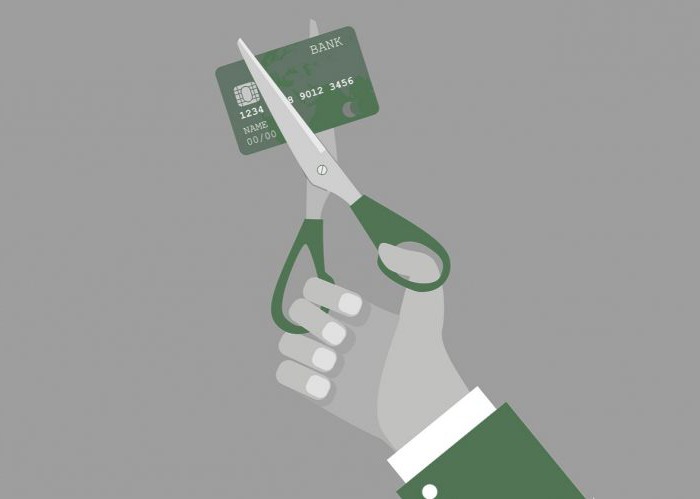Some believe that credit is bondage for many, many years, so they try to avoid loans by any means available. Others believe that it is better to take money from the bank for something you need now than to save for it for a long time. It is difficult to say which of them is right - everywhere there are pros and cons. But even with the most responsible creditors there is such a nuisance as a loan delay. Sberbank, Alfa Bank, VTB - not a single financial institution is insured against late payments by its customers. What to do when the deadline is already running out, and there is no way to pay? And what is this fraught with?
Long-term perspective
To begin with, what can result in late payment of loan installments in the long term. Regardless of which bank issued - Gazprombank, UniCredit Bank, Rosselkhozbank or Sberbank - a cash loan or an overdraft by credit card, you will have to pay for delays.

In the case of systematic non-payments, the bank has the full right to apply to the court, by the decision of which the debt amount will be recovered from the non-payer. In addition, even if the borrower, who had delinquency, after some time nevertheless repaid them, his credit history will be spoiled, and it will be much more difficult for him to get a new loan.
In outline
Conditionally, penalties for late payment of loans are divided into two types: penalty (which is accrued each day of delay and amounts to a certain amount of the loan installment) and a fine (it is usually assigned after a certain period of delay). The paradox is that banks have the right to independently determine the amount of punishment that will entail loan overdue. Sberbank, which is one of the leading financial institutions in Russia, is no exception: it has its own methods of working with defaulters.
How to find out about debt
Sberbank provides loans to individuals easily, while requiring a minimum number of documents. Amounts, of course, depend on the solvency of a particular borrower. The bank can issue funds in two forms: in cash - this is when money is handed out, and non-cash when the client receives a plastic card on which there is a certain amount.

It is worth noting that one of the relatively new forms of credit is overdraft - the ability to continue to use a plastic card even after it runs out of money: the account will simply go into minus, which then the card holder will need to pay off (if he does not make this money himself, they will be debited from any subsequent transfer of funds to the card). In order to find out if there is still a delay in a loan taken in non-cash form, it is enough to simply check the card balance at any ATM. If the bank (the same Sberbank) issued a cash loan to you, then you can use the user’s account on the website of the financial institution - there will be all the available information. In addition, it is possible to contact consultants by phone, however, for this you will have to inform them of your loan agreement number.
Types of punishment
Of course, there are completely different reasons for the delay in the loan at Sberbank. The consequences of this, as already mentioned, can be long-term (they have already been mentioned) and short-term. We’ll talk about the latter now.
Banks apply several types of sanctions to non-payers:
- a fine in a fixed amount;
- penalty - a certain percentage of the loan amount that is accrued for each day of delay;
- fine gradually increasing;
- penalty - a certain percentage of the remaining loan amount.
It would be at least unreasonable to use only one type of punishment, which is why banks combine them, for example, in addition to penalties, which are levied for each new day of non-payment, the penalty that the borrower will be required to pay if he has 1 month delay in loan. Sberbank, for example, often uses this approach in relation to its debtors.
How to solve a problem?
At the same time, given the recent increase in the number of unpaid loans, banks are meeting those who honestly admit their insolvency by proposing a review of certain loan conditions. Of course, such issues are resolved individually.

Sberbank does not shy away from such a practice. “Loan arrears - where to call?” - this question sometimes arises even before the actual fact of debt appears. Usually, those who ask them try to find answers on the Internet, instead of contacting the bank itself and explaining the situation, try to find a real solution to the problem. In the event that repayment of the loan is not possible due to the circumstances, it is better to inform the bank in advance - perhaps this will help to avoid sanctions from the financial institution.
The size of the sanctions
What is the percentage of delay in the loan of Sberbank? It depends on the type of loan that the borrower took, so there is no way to unequivocally answer this question.

If we are talking about an ordinary loan, then the daily penalty will be 0.5% of the amount that the borrower should have paid. As for short-term or express loans, here the interest is much higher - from 6 to 9 per day of non-payment. After some time, a fine in the amount of 300 to 500 rubles will be added to the total amount of debt (which now consists of the amount of obligatory payment and accrued interest).
Recidivists
In the event that the borrower does not pay off his debts within a month, Sberbank may demand early repayment of the loan, and in full, in which case no one will care about the circumstances of the non-payer. If this does not work, then after three months of non-payment, the bank has the full right to appeal to collectors or to sue to recover funds, due to which the debt will be liquidated.
Restructuring and the struggle for their rights
Suppose a client has a delay in a loan at Sberbank. What to do? First of all, do not panic. In the event that payments were late for a good reason, even if the bank was not warned about this in advance, you can contact the customer service department and provide all the necessary documents that can confirm that the payment was not made due to circumstances beyond your control . In such cases, most often banks allow you to deposit money later, and sometimes they restructure them - they recalculate the interest on the loan, making payments on it rise even for someone who is in a difficult life situation. For example, a bank may offer to pay only the principal amount of the debt, and return the interest calculated on the loan when the borrower's financial situation improves.

If the money seems to have been deposited, but for some reason did not come to the account, we can talk about a bank error. That is why it is necessary to keep all terminal checks or bank checks confirming the fact of payment. If the “non-payer” can prove that the funds were deposited and the bank mistake was to blame, then all claims will be removed, and the credit history, which the fact of untimely payment of money can ruin, is corrected.
One day delay
Any bank imposes sanctions for non-payers in order to protect themselves as much as possible from the loss of funds issued as a loan. Sberbank is no exception. A loan delay (1 day seems to be an insignificant period, but it will still be possible to spoil the nerves) in this case, too, may result in some difficulties for the borrower.

In the event that the non-payment occurred really due to the fault of the payer, the bank will simply charge a fine, the amount of which for such a short period is unlikely to be significant. But sometimes it happens that the money was deposited, but for some reason the delay was already fixed. What is the reason for this?
In lending, there is such a thing as a “technical error”: the funds that were deposited were not credited to the account immediately, but after some time. Typically, the interval between depositing and crediting is no more than a day, but due to interruptions in the operation of banking networks, it can increase. If the client can prove that he paid the loan in a timely manner, but the funds were not credited to the account due to circumstances beyond his control, the delay will be canceled.
Restructuring failure
Suppose a payer has a delay in a loan. Sberbank allowed restructuring and reduced the amount of mandatory payments. But now comes the end of the period during which it was possible to pay less, but the financial situation has not improved, and it is simply not possible to make contributions in full. What to do in such cases?
Formally, the bank cannot limit the number of restructurings, that is, it is possible to extend a loan, of course, with the approval of a financial institution, for an infinitely long time. Another question - will the bank agree to this?
It is worth noting that the right to change the conditions of payments is reserved for people without a primary source of income (that is, those who have lost their jobs), those who suffer from a disease that requires serious financial investments for treatment, as well as people in whose families the child was born, or women still awaiting his birth. All these circumstances are considered sufficient to recalculate the required payments.
More on Restructuring
As already mentioned, Sberbank gives loans to individuals, under certain conditions, without any problems. Not so long ago, a special division of the bank was created, which deals with precisely those payments for which there are difficulties with mandatory payments, the so-called problem loans. In this regard, restructuring has become a simpler procedure. The bank even offers several of its options:
- Extension of loan repayments. For example, for mortgage loans, the term can be increased up to 35 years, and for consumer loans - up to seven. It is logical that if the amount is stretched for a longer period, then the amount of monthly payments will be less. Without problems, such a “concession” will be applied to those who contributed most of the initial loan term in a timely manner, and then, due to the circumstances, could not continue to do so.
- Credit holidays. Usually they are provided to families in which the children were born, and the funds that should have been used to repay the loan will be used for other purposes.
- Individual payout schedule. Such loan modifications are often offered to those who do not have a stable income, for example, seasonal workers, who in one month can earn an amount many times higher than the installment, and in the other they can not accumulate a quarter of the obligatory payment. Banks advise to warn in advance about such unstable "profitability", in which case they will save the payer from fines and penalties that will be charged for delinquencies, and also allow you to make payments not in full, however, for this the client will have to pay off the debt that will accumulate during his temporary insolvency, for one payment.
Such methods of restructuring can be combined, but, of course, this is possible only if the client, even in the absence of funds to repay the loan, remains a bona fide payer and does not begin to hide from the bank.
Conclusion
The client of absolutely any financial institution may experience a delay in the loan. Sberbank, like other banks, has a number of penalties for this case, which will punish the non-payer, but at the same time it has a number of tools that, if there is a good reason for late payments, will help ease the credit burden. The main thing in relations with the bank is honesty. It is she who, even in the most difficult circumstances, will make it possible to count on a change in lending conditions that will make contributions affordable. In any case, you will have to pay your debts, so it’s better to do it in a timely manner, and not when collectors knock on the door.